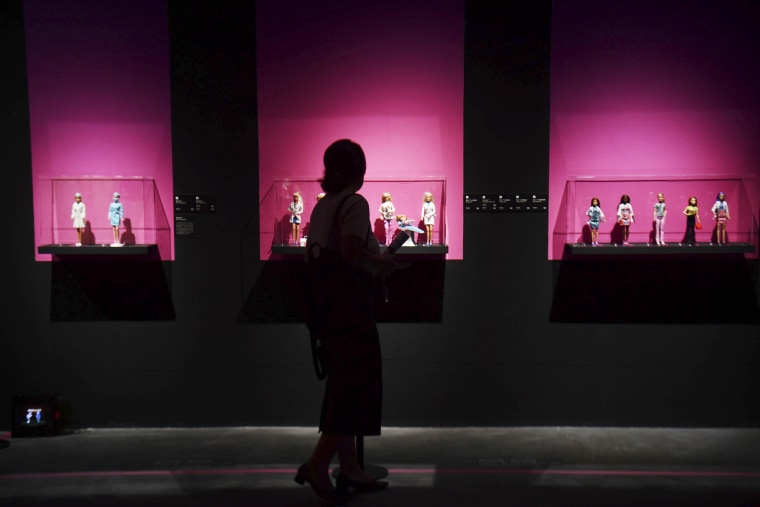HONG KONG — Like women around the world, Yu Yutian sees the movie “Barbie” as a useful litmus test for dating.
“If a man is willing to watch ‘Barbie,’ understands half of the themes and thinks the movie is good and interesting after leaving the theater, then he is a normal guy with normal values and stable emotions,” Yu, 30, who freelances in business communication in Beijing, wrote on Weibo, China’s equivalent of Twitter, now known as X.
Any man who “hates” and “slanders” the movie, she wrote, is “narrow-minded” and in thrall to “male chauvinism.”
Her post was quickly circulated on social media, gaining more than 2 million views. Female users used it as a guide to gauge their partners’ views on feminism and patriarchy. But Yu was soon bombarded by insults and curses, mainly from males.

Yu’s experience mirrors the dilemma faced by “Barbie” and feminism in China, where there is growing awareness of gender inequality but also a social backlash and a government crackdown on related activism.
Since director Greta Gerwig’s satirical movie about Mattel’s iconic doll was released July 21, it has had a modest but notable performance in China, the world’s second-largest film market after the U.S. The country’s biggest hits these days tend to be domestically made, male-dominated movies with patriotic themes, while there is a growing aversion to Hollywood blockbusters amid U.S.-China tensions.
“I think it is a work that far exceeds expectations,” Yu said of “Barbie.” “Very high quality and very tender feminist work. I think it may be the best feminist expression that can exist in the commercial environment.”
As of Friday, “Barbie” had earned more than $32 million in China, according to Maoyan, a platform that tracks Chinese box office data, compared with more than $485 million in the U.S.
Though that is less than the $47 million pulled in so far by “Mission: Impossible — Dead Reckoning Part One,” the audience response to “Barbie” led Chinese theaters to increase the number of showings from 2.4% of screens the day the movie was released to 10% a week later.
“Barbie” has been highly praised on Douban, China’s version of IMDb, where it has a rating of 8.3 out of 10 and 190,000 written reviews. The movie has been No. 1 on the site’s “Weekly Word-of-Mouth Movie List” for three consecutive weeks.
“It is rare for Chinese women to have the opportunity to watch a high-purity female-oriented film in theaters,” one user wrote on the site.
Yu said “Barbie” had struck a chord with women, even if they had no personal connection to the doll.
“My childhood had nothing to do with Barbie,” said Yu, whose family found the dolls too expensive. “I think everyone’s excitement is more because of the meaning of the content itself.”

The film has made a deep impression on moviegoers like Xiao Weijia, 23, who freelances in graphic design in the eastern province of Shandong.
“I was told that I couldn’t become a photographer when I was young because the equipment was too heavy for a girl to carry,” she said. “But after watching ‘Barbie’ and knowing it is produced by many women, I realized that I might be able to become a photographer, just like men.”
It has also set off heated discussions about feminism and patriarchy in China, where boys were favored over girls under the former one-child policy, and there is not a single woman in the 24-member Politburo atop China’s ruling Communist Party. The government has in recent years arrested feminist activists and expressed alarm at changing gender roles, and a high-profile sexual harassment case against a prominent TV host was dismissed last year.
The relevant topics gathered more than 100 million views on Chinese social media platforms, where people shared their feelings after watching the film.
“Barbie is having a superb day every day,” read one Weibo comment on Friday. “Before you become someone, you need to please yourself and trust in yourself.”
For some Chinese moviegoers, “Barbie”’s feminist message still doesn’t hit as hard as they’d like. The Chinese word used for “feminism” in the government-approved subtitles is “nu xing zhu yi,” which literally means “women-ism,” rather than the more commonly used “nu quan zhu yi.” In Chinese, “quan” means “power” and has a more political connotation.
Susan Su, 24, a journalist from the southern province of Guangdong, said the most common topics of public discussion around the film were not its feminist concepts but “those pink products” being promoted in tandem with the film, such as dresses and nail polish.
Others have accused “Barbie” of portraying the problem of gender inequality in a shallow way, saying it is just a “slogan-shouting” movie.
Mirroring the conservative backlash in the U.S., “Barbie” has also been criticized as “a foreign force,” trying to “drive a wedge between men and women.” Some moviegoers reported seeing men angrily leave the theater before the movie’s end.
“I don’t need to read the reviews to know that male and female Chinese viewers will definitely have two extremes in their evaluation of this movie,” Jiang Juan, associate professor at Communication University of China in Beijing, said in an email. “The reason is that Chinese women have become more aware of their gender over the past decade, which can be called an ‘awakening,’ while most men’s gender concepts have remained stagnant.”
Jiang added that society’s attempts to “demonize feminism” had resulted in many women being reluctant or even afraid to identify themselves as feminists.
Tan Jia, associate professor of cultural studies at the Chinese University of Hong Kong, said the demonization of feminism in China might be an indirect sign of progress.
“This shift in attitude may be attributed to the growing prevalence of misogyny, particularly online misogyny toward feminists,” she said. “However, it also signifies the increasing popularity and significance of feminist discourses within a broader context.”
Tan said the smashing success of the film, which has earned more than $1 billion globally, also showed that feminist content with sophisticated storylines can be profitable.
“This may encourage profit-oriented Chinese media companies to invest in larger projects that incorporate feminist plotlines, potentially creating more opportunities for feminist writers and filmmakers,” she said.







